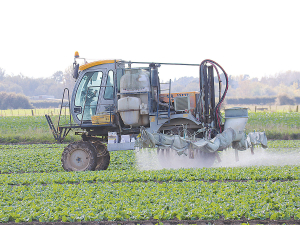Rural contractors call for national air plan standard in RMA reforms
Rural contractors want the Government to include a national standard for air plans as part of its Resource Management Act reforms.
 The new standard details requirements for a spray plan, notification of affected parties and putting up signage to provide better communication of spraying activities.
The new standard details requirements for a spray plan, notification of affected parties and putting up signage to provide better communication of spraying activities.
Wairarapa-based Clinton Carroll refers to the new agrichemical standard - NZS 8409:2021 - as the spraying contractors' bible.
As Rural Contractors NZ vice-president and the organisation's representative on the New Zealand Agrichemical Education Trust (NZAET), Carroll says it's time people got the updated version.
He believes the new standard needs to be more widely promoted. It's the first revision in nearly 20 years and Carroll explains that it brings agrichemical use into the 21st century even extending to guidance for new technologies - such as automated sprayers, unmanned aerial vehicles (UAVs) and drones.
"Some spraying contractors and others using agrichemicals seemed to remain unaware that the new standard is out and available for free if they hold a current Growsafe certificate such as Registered Chemical Applicator (RCA)."
NZAET, which oversees Growsafe, general manager Jane Lamb encourages all agrichemical users to take a look at the new standard saying it "is a lot easier to read than the regulations themselves".
She says users will find all the regulatory and good practice guidelines for safe, responsible agrichemical use in one place.
The new agrichemical standard provides practical and specific guidance on the safe, responsible and effective storage, handling and use of agrichemicals - including pesticides and veterinary medicines.
Meanwhile, Carroll says all training is now based around the new standard and spray contractors holding a Growsafe RCA certificate will need to show they are up to speed when they come to renewals.
"Basically, it's your bible," he says. "If you want to know what's required to apply a chemical or check on how best to dispose of residues or containers, this is what you need."
The new standard replaces that in place since 2004 with the NZAET leading the review.
Carroll says the standard also provides more detail on how spray contractors, farmers and other agrichemical users should dispose of sprayer washings.
"This gives some clear guidance on where you can wash down and the steps you need to take to reduce any potential environmental harm."
The updated standard also includes a new requirement to undertake an onsite risk assessment immediately prior to any spraying. It also gives more detailed requirements for a spray plan, notification of affected parties and putting up signage to provide better communication of spraying activities.
The 2021 Management of Agrichemicals standard is available on the Growsafe website.
Agrisea NZ has appointed Craig Hudson as it's new chief growth officer.
State farmer Landcorp, trading as Pamu, is a forecasting a full-year net profit of around $100 million.
Tony Aitken, chief executive of Ruralco, has been awarded the Excellence in Business Leadership Award at the ANZ Business of the Year Awards.
Global trade has been thrown into another bout of uncertainty following the overnight ruling by US Supreme Court, striking down President Donald Trump's decision to impose additional tariffs on trading partners.
Controls on the movement of fruit and vegetables in the Auckland suburb of Mt Roskill have been lifted.
Fonterra farmer shareholders and unit holders are in line for another payment in April.

OPINION: Here w go: the election date is set for November 7 and the politicians are out of the gate…
OPINION: ECan data was released a few days ago showing Canterbury farmers have made “giant strides on environmental performance”.